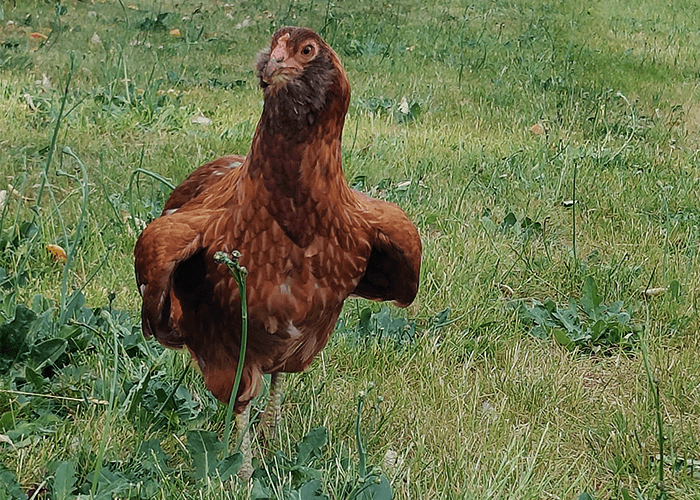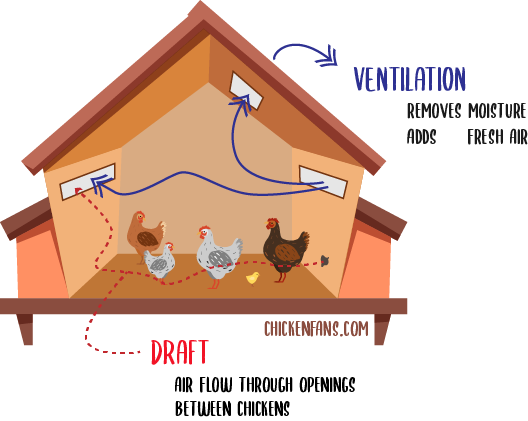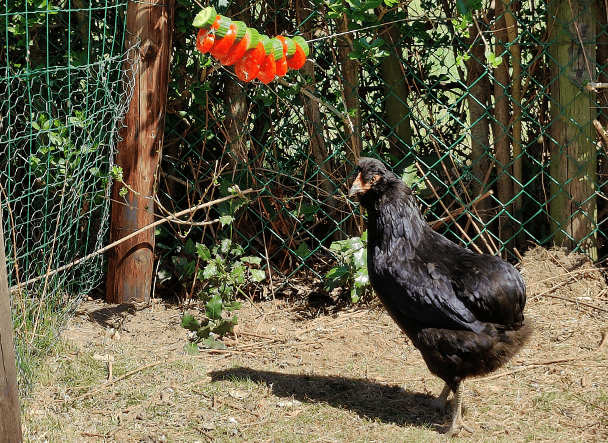How To Cool Chickens Down (And What NOT To Do!)
Hot, tropical summer months can be unpleasant for many animals, including birds and chickens. As a chicken keeper, you’ll have to protect your flock from scorching heat and provide plenty of shelter and fresh cool water to help them stabilize their body temperature. But that’s not all you can do!
We’ll take you through the MUST DO’s, the CAN DO’s, and the DON’T DO’S. But we also address the signs of heat stress in chickens and determine how well they stand high temperatures.
Let’s get started!
Can Chickens Stand High Temperatures?
Chickens take temperature changes reasonably well, but they stand cold temperatures better than hot ones. A chicken’s body fat, found under the skin, and their warm feathery coat protect them from low temperatures, but it makes them not fond of hot temperatures.
The most pleasant temperature for chickens is around 75 degrees Fahrenheit (24°C) or below. This depends on the chicken breed (chicken breeds with larger combs are more heath tolerant), but it’s best to take precautions when a heatwave is on its way.
Ambient temperatures of 85 degrees Fahrenheit (30°C) and more impact chickens negatively, causing a reduction in feed intake and body weight and affecting egg production. Air temperatures of 100°F (37,5°C) and more can be lethal for poultry.
Next to high temperatures, humidity is also an important factor when dealing with heat stress in chickens. So it is critical to monitor both temperatures and humidity levels during summer.
When using misters inside the coop or barn, please check the humidity level; it should never exceed 50%.
Can Heat Kill Chickens?
Yes. In rare cases, heat stress, followed by a heat stroke, can cause death.
When a chicken cannot cool down its body temperature by seeking shelter or drinking, she’s in imminent danger. A chicken’s normal body temperature is around 104-107°F (41-42°C), but in hot conditions and lacking water or shade, they can’t regulate their body temperature.
A body temperature of 114°F (46°C) is deadly for a chicken.
Signs Of Heat Stress In Chickens
Panting, rapid breathing and fluffed-up wings are the most common signs of heat stress in chickens. It means they’re hot and need to cool down, but there is no need to be alarmed immediately. Just provide plenty of shade and cool water, and they’ll be fine.
During average ‘room temperatures’ between 65°F (19°C) and 75°F (24°C), a standard respiration rate of a chicken is somewhere between 20 to 60 breaths per minute. Temperatures above 80°F can increase this up to 150 breaths per minute. Although panting helps them regulate their body temperature, studies show it negatively impacts egg production and egg quality.
Hot, tropical summer months can be unpleasant for many animals, including birds and chickens. As a chicken keeper, you’ll have to protect your flock from scorching heat and provide plenty of shelter and fresh cool water to help them stabilize their body temperature. But that’s not all you can do!
We’ll take you through the MUST DO’s, the CAN DO’s, and the DON’T DO’S. But we also address the signs of heat stress in chickens and determine how well they stand high temperatures.
Let’s get started!
Can Chickens Stand High Temperatures?
Chickens take temperature changes reasonably well, but they stand cold temperatures better than hot ones. A chicken’s body fat, found under the skin, and their warm feathery coat protect them from low temperatures, but it makes them not fond of hot temperatures.
The most pleasant temperature for chickens is around 75 degrees Fahrenheit (24°C) or below. This depends on the chicken breed (chicken breeds with larger combs are more heath tolerant), but it’s best to take precautions when a heatwave is on its way.
Ambient temperatures of 85 degrees Fahrenheit (30°C) and more impact chickens negatively, causing a reduction in feed intake and body weight and affecting egg production. Air temperatures of 100°F (37,5°C) and more can be lethal for poultry.
Next to high temperatures, humidity is also an important factor when dealing with heat stress in chickens. So it is critical to monitor both temperatures and humidity levels during summer.
When using misters inside the coop or barn, please check the humidity level; it should never exceed 50%.
Can Heat Kill Chickens?
Yes. In rare cases, heat stress, followed by a heat stroke, can cause death.
When a chicken cannot cool down its body temperature by seeking shelter or drinking, she’s in imminent danger. A chicken’s normal body temperature is around 104-107°F (41-42°C), but in hot conditions and lacking water or shade, they can’t regulate their body temperature.
A body temperature of 114°F (46°C) is deadly for a chicken.
Signs Of Heat Stress In Chickens
Panting, rapid breathing and fluffed-up wings are the most common signs of heat stress in chickens. It means they’re hot and need to cool down, but there is no need to be alarmed immediately. Just provide plenty of shade and cool water, and they’ll be fine.
During average ‘room temperatures’ between 65°F (19°C) and 75°F (24°C), a standard respiration rate of a chicken is somewhere between 20 to 60 breaths per minute. Temperatures above 80°F can increase this up to 150 breaths per minute. Although panting helps them regulate their body temperature, studies show it negatively impacts egg production and egg quality.
Provide dust baths
Whether it is hot or colder, chickens love dust baths. It’s the ideal activity to keep them happy, entertained, and clean! During a heatwave, provide enough dust baths in shady areas like under the chicken coop. As an extra, you can wet the chicken run ground and make them a mud bath instead of a dust bath, so they can keep themselves cool by kicking the wet dirt on their feathers and skin.
Clean out the coop regularly
Cleaning out the chicken coop isn’t a popular chore, but chicken poop can easily smell like ammonia during hot weather, which makes your chickens suffer from bad air quality. If you’re using the deep litter method inside the coop, check the air quality regularly. Otherwise, the deep litter method can produce toxic ammonia gasses that endanger the welfare and health of your flock.
The chicken coop should never smell foul or smell like ammonia.
Things You CAN Do To Keep Chickens Cool
- Ice their food/give cold treats
- Ice their water
- Wet the chicken run ground or/ and vegetation above and around the run
- Temporarily keep them inside the house
Ice their food/give cold treats
You can feed your chickens regular healthy snacks like peas, yogurt, or corn, but frozen. Use a cupcake or muffin pan, fill it with their favorite treat like canned corn, and add water. Put in the freezer for 4 hours, and their tasty summer snack is ready.
Or hang a lettuce pinata they can peck or put some tomatoes and cucumber on a string. They’re mostly water, so they aren’t a problem for chickens.
But there’s a ground rule: don’t exaggerate. Never feed your chickens more than 10% of their total feed of the day in snacks.
Ice their water
Providing your flock with cool water mainly means it needs to be replaced regularly, not that you have to put ice blocks in it. You can, but it will probably melt very fast, so the benefit of cool water is only temporary. It’s always better to change their water at least twice a day during a heatwave.
Wet the chicken run ground or/and vegetation above and around the run
You can create your own ‘airconditioned’ chicken run by using the ground and surrounding vegetation as a natural barrier and moistening them. Hose down the chicken run soil a couple of times a day and spray water on surrounding trees or plants. This reduces the temperature inside the run and makes water trickle down from the trees.
If you don’t have any trees in your run’s surroundings, use a shade cloth to cover the run, spray with water, and create a micro-climate.
If you’re planning on using misters, only use them outside and not inside the coop or barn. Humidity is an important factor when dealing with heat stress in chickens. If the humidity in the coop is too high, the birds can’t downregulate their body temperature very well.
Temporarily keep your chickens inside the house
Keeping an eye on your chickens during a heatwave 24/7 isn’t possible when you’re working all day. Temporarily putting the birds in a garage or storage area can be an option to consider.
Of course, that’s not an ideal situation. First of all, chickens poop a lot, so prepare yourself for serious cleaning when you come home from work. You can train your chickens to wear a chicken diaper, but even diapers need to be taken off at least twice a day for an hour to prevent irritation. Furthermore, chickens need outside space. They aren’t meant to be kept inside, but it shouldn’t be a problem for a short period.
What NOT To Do To Cool Down Chickens
- Spray your chickens with a hose
- Provide a water pool or bath
Although chickens aren’t scared of water, they’re not particularly fond of it.
Chickens’ feathers are water-resistant and work as a raincoat. So spraying them with water won’t cool them; you’ll have to soak them to get the water to their skin. It’ll just give extra stress. They don’t like water baths either.
Providing them a kids pool to cool off in won’t do the trick either. Maybe they’ll splash their feet in it, but most chickens avoid wading through water. When not replacing the pool’s water frequently, it won’t be sanitary anymore and can be a hotbed for bacteria.
Summary
Chickens are very capable of regulating their body temperature, but during scorching hot temperatures, they can use some extra help. Always provide plenty of cool, clean water and enough shade spots so your chickens can cool off. Cleaning and ventilating the coop is essential to prevent your hens from suffering bad air quality.
Post time: Aug-28-2023



